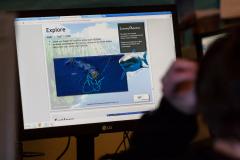Measuring Data Skills in Undergraduate Student Work: Development of a Scoring Rubric
Data literacy, or students’ abilities to understand, interpret, and think critically about data, is an increasing need in K–16 science education. Ocean Tracks College Edition (OT-CE) sought to address this need by creating a set of learning modules that engage students in using large-scale, professionally collected animal migration and physical oceanographic data to answer scientifically relevant questions and think critically about how researchers collect and interpret data. In a field test in nine undergraduate marine biology, oceanography, and general biology courses, we undertook a collaborative educator-researcher process to develop a rubric-based scoring system that could reliably measure student performance across seven data skills. This paper documents the development and testing process, shares the resulting rubric, and discusses how the results of the rubric development process and pilot scoring of 32 pieces of student work affected curriculum refinement. We conclude with a discussion of how undergraduate science educators might be able to further refine and apply this preliminary rubric for use in instruction or educational research. Data literacy, or students’ abilities to understand, interpret, and think critically about data, is an increasing need in K–16 science education. Ocean Tracks College Edition (OT-CE) sought to address this need by creating a set of learning modules that engage students in using large-scale, professionally collected animal migration and physical oceanographic data to answer scientifically relevant questions and think critically about how researchers collect and interpret data. In a field test in nine undergraduate marine biology, oceanography, and general biology courses, we undertook a collaborative educator-researcher process to develop a rubric-based scoring system that could reliably measure student performance across seven data skills. This paper documents the development and testing process, shares the resulting rubric, and discusses how the results of the rubric development process and pilot scoring of 32 pieces of student work affected curriculum refinement. We conclude with a discussion of how undergraduate science educators might be able to further refine and apply this preliminary rubric for use in instruction or educational research.

